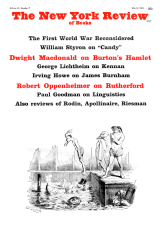Of these two rather moderate books, David Ward’s is probably the more reliable. J. J. Lynx’s, by virtue of its charming hero, definitely the more attractive. Mr. Ward’s The Shortest Route to Paradise tells the story of Charles Peace, a notorious English house-breaker of the mid-nineteenth century who was finally hanged for murder and while this book suffers from a lot of fatuous social and moral hindsight, it has an air of careful documentation, of sober attention to detail, which invites belief. Mr. Lynx, on the other hand, is anything but sober his The Prince of Thieves, which deals with the life and gay times of George Manolesco (alias the Duke of Otranto, alias H. H. Prince Lahovary, historical prototype of Raffles and Arsène Lupin), abounds in imagined conversations and encounters so arch and yet so prurient that one feels as though one were reading a Victorian kitchen romance illustrated by early examples of the dirty photograph—you know the kind of thing, grotesqueries of black hose and enormous yellow bottoms. Nevertheless, it must be allowed that the criminal files of Europe do give Mr. Lynx broad warrant for these reconstructions; that Mr. Lynx, unlike Mr. Ward, does not come all over priggish about forensic problems; and that George Manolesco is in any case a big enough character to survive his biographer’s shortcomings.
The contrast between Peace and Manolesco is commonplace but perennially instructive. Peace, pace the Robin Hood legend that grew up among the lower classes after his death, is a dreary and repellent figure. Born in a Sheffield slum, he was, as Mr. Ward frequently and oppressively reminds us, the victim of social circumstance. But despite Mr. Ward’s insistence, Peace is quite simply too unamiable to retain our sympathies on that account. A natural bully, he strutted and bellowed in victory; religious by temperament, he was quick to grovel and whine in defeat. A skilful burglar, he yet confined himself to small and uninteresting hauls, the profits from which he expended with neither style nor imagination. True, there is a pleasing story of how he impersonated an elderly bourgeois and helped the police search a train for himself; but for the most part the impression we receive is of a bad-tempered lout, a small-time and brutal public enemy strictly in the tradition of Bill Sykes. Even when Peace was at his most successful, he gave off the mangy stink of the underdog.
George Manolesco had a more genteel start in life. The son of a Rumanian officer (albeit a seedy one), he was early sent to a college for Naval Cadets, which he detested and deserted, at the age of fifteen, to try his luck in Constantinople. His luck was in. Starting with the bored wife of a French diplomat, he graduated from page-of-honor-cum-gigolo to a borrowed patent of nobility as the Rumanian Prince Lahovary, a role which he sustained with far greater credit than the drunken clown to whom it belonged. Apart from occasional excursions into cheating at cards. “His Highness’s” method was constant and fool-proof: he would win the confidence, then the favors, then the diamonds of impressionable women, who could not complain to police or husbands about a theft of jewelry which manifestly included their most precious jewel.
Manolesco-Otranto-Lahovary, was a ponce and a parasite, but he has many acts of kindness to all three of his names. He offered violence to no one, and he gave sumptuous pleasure and amusement all round—not least to the women whom he robbed. A fair exchange, one might say, an equitable redistribution. And another thing. Manolesco, in so many ways comparable to Casanova, was comparable also in this, that by exploiting society’s lusts and vanities in order to pick its purse, he fulfilled, consciously or not, the function of ironist and even of moralist. He both mocked pretension and administered condign rebuke.
The judgment these two books invite is an aesthetic one. Charles Peace, theoretically excusable because socially underprivileged, arouses only disgust for his crude and furtive petty thefts; while George Manolesco, who had been educated to know better and to pursue an honorable career, excites laughter and even applause. Why? Because Manolesco had the manners and habits of a gentleman, because he stole a thousand times as much as Peace with a tenth of the effort, and because he developed a method which was witty, civilized, apposite, and deft. Some would call this preference sheer snobbery: I choose to call it a matter of style.
This Issue
May 14, 1964



